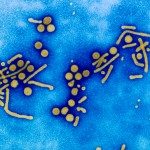Lien vers Pubmed [PMID] – 24938813
Environ Sci Pollut Res Int 2015 Jun;22(11):8003-9
Pollutants via run-off into the ocean represent a potential threat to marine organisms, especially bivalves such as oysters living in coastal environments. These organisms filter large volumes of seawater and may accumulate contaminants within their tissues. Pesticide contamination in water could have a direct or indirect toxic action on tissues or cells and could induce alteration of immune system. Bivalve immunity is mainly supported by hemocytes and participates directly by phagocytosis to eliminate pathogens. Some studies have shown that pesticides can reduce immune defences and/or modify genomes in vertebrates and invertebrates. Metaldehyde is used to kill slugs, snails and other terrestrial gastropods. Although metaldehyde has been detected in surface waters, its effects on marine bivalves including the Pacific oyster, Crassostrea gigas, have never been studied. Given the mode of action of this molecule and its targets (molluscs), it could be potentially more toxic to oysters than other pesticides (herbicides, fungicides, insecticides, etc.). Effects of metaldehyde on oyster hemocyte parameters were thus monitored through in vivo experiments based on a short-term exposure. In this work, metaldehyde at 0.1 μg/L, which corresponds to an average concentration detected in the environment, modulated hemocyte activities of Pacific oysters after an in vivo short-term contact. Individuals belonging to two families showed different behaviours for some hemocyte activities after contamination by metaldehyde. These results suggested that effects of pollutants on oysters may differ from an individual to another in relation to genetic diversity. Finally, it appears essential to take an interest in the effects of metaldehyde on a wide variety of aquatic invertebrates including those that have a significant economic impact.

